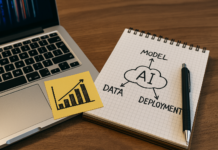The technological landscape is rapidly evolving, and the emergence of Crypto AI startups represents one of the most significant shifts in modern innovation. These ventures combine artificial intelligence and blockchain to create systems that are both intelligent and decentralized. By merging these two domains, Crypto AI startups are redefining how data, computation, and ownership are structured in the digital economy.
Artificial intelligence has already transformed industries by automating decision-making and generating new insights from vast datasets. Meanwhile, blockchain has introduced transparent and trustless systems for managing value and verifying transactions. When these technologies intersect, they produce a new class of business models centered on distributed intelligence, tokenized data, and open governance.
Crypto AI startups seek to overcome the limitations of centralization. Traditional AI models rely heavily on large corporations controlling data and computing resources. In contrast, decentralized AI networks distribute these resources among participants who receive tokens for contributing. This approach allows broader participation, improves resilience, and aligns incentives across users, developers, and investors.
The following sections explore the foundation, business models, infrastructure, and technical hurdles facing Crypto AI startups, along with examples that illustrate how this convergence could shape the future of digital innovation.
Foundations of Crypto + AI Systems
Infrastructure and Network Layers
To operate efficiently, Crypto AI startups depend on decentralized infrastructure layers for compute, storage, and communication. These networks replace centralized cloud providers with distributed nodes that contribute processing power. Nodes can offer GPU or TPU capacity in exchange for tokens, enabling a community-driven alternative to centralized data centers.
Decentralized storage protocols such as IPFS or Arweave allow AI model weights, datasets, and metadata to be stored in a verifiable and immutable manner. Combined with communication protocols, these layers create a foundation for scalable decentralized inference networks. For Crypto AI startups, this architecture ensures transparency and censorship resistance while distributing ownership among contributors.
Verification and Accountability
An essential challenge for Crypto AI startups is ensuring that AI computations performed by decentralized nodes are genuine. Verifiable computation frameworks, zero-knowledge proofs, and fraud-proof protocols help validate results. By requiring cryptographic evidence of computation, these systems reduce the risk of dishonest behavior and strengthen the network’s reliability.
Accountability mechanisms, including staking and reputation systems, encourage nodes to act honestly. When nodes stake tokens to participate in computation, they risk losing them if they misbehave. This economic alignment between accuracy and reward becomes a defining principle for Crypto AI startups aiming to scale secure AI systems.
Tokenization of Models and Data
Tokenization turns AI assets—models, datasets, inference results—into tradeable digital entities. Crypto AI startups use token standards to represent ownership and access rights. For example, a model developer can issue tokens granting holders the ability to query the model, while dataset owners receive micro-rewards each time their data improves performance.
This approach transforms how intellectual property circulates in the AI ecosystem. Instead of relying on closed licensing agreements, tokenized ownership allows transparent and programmable distribution of value. Over time, this may form open marketplaces where anyone can invest in or contribute to model development.
Governance and Decentralization
Crypto AI startups frequently adopt decentralized governance. Token holders can vote on system upgrades, data inclusion, or revenue policies. This participatory framework replaces centralized management with community consensus. Effective governance ensures adaptability while maintaining fairness and accountability among diverse stakeholders.
The degree of decentralization depends on each project’s design goals. Some opt for fully permissionless participation, while others maintain partial control to meet regulatory or performance requirements. In either case, decentralized governance reinforces the democratic ethos behind Crypto AI startups.
Business Models Emerging from the Convergence
Token-Based Micropayments
Most Crypto AI startups monetize their services through token-based micropayments. Each AI query or computation consumes a small token amount. Payments flow directly to the contributors providing computational power or data. This frictionless model supports high-volume usage while preserving transparency.
Because on-chain transactions can be costly, many startups employ layer-two solutions or off-chain channels. This combination of AI automation and blockchain efficiency enables continuous interaction between users and decentralized AI networks.
Staking and Reward Systems
Staking mechanisms remain vital for maintaining integrity. Participants stake tokens to signal commitment and reliability. When their nodes perform inference or training correctly, they receive rewards; if they fail, part of their stake is forfeited. This feedback loop motivates consistent, trustworthy performance across the network.
The economics of staking also help bootstrap early communities. New Crypto AI startups may allocate a portion of initial tokens to reward early adopters who contribute compute or data. Over time, the model encourages sustainable engagement rather than speculative trading.
Shared Revenue and Incentive Alignment
Unlike traditional AI companies, Crypto AI startups distribute revenue transparently through smart contracts. Every contribution—data provision, infrastructure maintenance, algorithm design—is recorded and compensated automatically. This equitable structure nurtures collaboration rather than competition within the ecosystem.
By aligning incentives between creators and users, these startups transform customers into stakeholders. Such alignment encourages open innovation, accelerates development, and builds long-term trust among community members.
Tiered Access and Utility Tokens
Many Crypto AI startups use a tiered access model. Basic AI features may remain open, while advanced capabilities require token payment. Tokens thus gain utility beyond speculation—they function as digital keys to premium services. This system promotes organic token demand while allowing gradual scaling of user adoption.
Tiered models are also practical for developers integrating AI modules into their own products. Tokens become a universal method of payment across interoperable services, increasing liquidity and network effects.
Use Cases of Crypto + AI Integration
Decentralized Model Hosting
A major milestone for Crypto AI startups is decentralized model hosting. Instead of a single entity serving AI responses, models are distributed across nodes worldwide. Each node contributes compute resources and earns tokens when queries are processed. This structure reduces dependency on centralized providers and democratizes access to AI capabilities.
Decentralized hosting is particularly attractive for industries that require transparency, such as finance or healthcare. By recording inference provenance on-chain, stakeholders can verify when and how a model produced a decision, fostering accountability in sensitive sectors.
AI-Driven Smart Contracts
Smart contracts can gain adaptive intelligence through AI integration. Crypto AI startups are experimenting with contracts capable of responding to dynamic data and predictions. For instance, an insurance policy could automatically adjust premiums based on real-time risk analysis. This intelligent automation enhances the functionality of blockchain systems beyond static rule sets.
The potential extends to decentralized finance, where predictive models forecast liquidity demand or detect anomalies. AI-driven logic may protect users from flash-loan exploits and market manipulation.
Data Marketplaces and Provenance Tracking
Another area in which Crypto AI startups excel is decentralized data exchange. Traditional AI companies often rely on proprietary datasets, but decentralized marketplaces allow global contributors to share data securely. Blockchain ensures provenance and ownership, while tokens provide financial rewards for valuable contributions.
This model democratizes data access and breaks monopolies. It also enhances data diversity, improving model generalization. Contributors remain in control of their data, knowing every use is logged and compensated transparently.
Authenticity and Digital Trust
As synthetic media proliferates, verifying authenticity becomes essential. Crypto AI startups are developing systems that detect tampered or generated content and record verification proofs on-chain. Such technology supports media outlets, education platforms, and legal systems that require trustworthy evidence.
By combining AI detection algorithms with immutable ledgers, startups create digital trust infrastructures. These solutions could combat misinformation, a growing concern in the age of generative models.
Technical and Economic Challenges
Scalability and Efficiency
Decentralized AI computation faces inherent performance limitations. Running large models across distributed nodes introduces communication overhead. To remain competitive with centralized APIs, Crypto AI startups must optimize protocols for latency, throughput, and cost efficiency. Techniques like model distillation, sharding, and edge inference may alleviate these constraints.
Security, Privacy, and Model Protection
Protecting model integrity is another challenge. Open access can lead to model theft or reverse engineering. Crypto AI startups invest in encryption, watermarking, and secure execution environments to safeguard intellectual property. Privacy-preserving learning methods allow sensitive data to improve models without direct exposure.
Token Volatility and Sustainability
Token economics must balance utility with stability. Excessive volatility discourages usage and undermines confidence. Sustainable design includes capped supply, deflationary mechanics, or algorithmic stabilization. Crypto AI startups that manage stable token value stand a better chance of long-term adoption.
Legal and Regulatory Landscape
Combining AI and crypto introduces complex legal questions. Tokens may fall under securities regulation, and AI governance faces scrutiny under emerging ethical frameworks. Crypto AI startups need proactive compliance strategies, including transparent disclosures and adaptable governance. Engaging with policymakers early can prevent future restrictions.
Ecosystem Growth and Collaboration
Collaboration lies at the heart of this ecosystem. Crypto AI startups often partner with layer-one and layer-two blockchain projects, cloud infrastructure providers, or research organizations. These alliances provide access to resources and technical expertise, accelerating innovation.
Community engagement through hackathons, grants, and open-source contributions also strengthens the ecosystem. Startups that invest in developer communities cultivate loyalty and establish early network effects. The most successful ventures treat decentralization not as a feature but as a philosophy guiding their operations.
For readers interested in related innovations and funding stories, visit Startupik’s crypto startups section to explore how other emerging teams are shaping this landscape.
Market Dynamics and Investment Landscape
The growing attention around Crypto AI startups has created a dynamic investment environment. Venture capital firms, corporate innovation funds, and specialized accelerators are all competing to identify the most promising teams at the intersection of artificial intelligence and blockchain. The appeal lies in the potential to build scalable infrastructure that powers future decentralized intelligence systems.
In recent years, funding for Crypto AI startups has steadily increased. Many investors who once focused on decentralized finance now see AI integration as the next growth wave. These investors are shifting from purely financial speculation to infrastructure development, supporting projects that emphasize verifiable computation, data ownership, and open governance.
The key driver behind this investment trend is long-term value creation. Traditional AI ventures often depend on user data and cloud dependencies that limit user control. By contrast, Crypto AI startups distribute both computational resources and data contributions across participants, aligning incentives between creators and users. This alignment fosters more sustainable growth and community resilience.
At the same time, institutional interest has introduced new expectations around compliance, transparency, and governance. Investors now look for teams capable of merging technical innovation with sound economic modeling and regulatory awareness. Startups that can meet these expectations have a better chance of securing capital and achieving scalability.
Competitive Positioning and Differentiation
The competitive landscape for Crypto AI startups is evolving rapidly. Established technology giants such as Google, Microsoft, and OpenAI dominate centralized AI infrastructure. For decentralized challengers to succeed, they must identify clear differentiators in accessibility, governance, and community ownership.
One strategy involves focusing on vertical specialization. Rather than attempting to replicate the general-purpose functions of large AI models, Crypto AI startups often target niche markets such as decentralized identity verification, autonomous finance, or peer-to-peer analytics. By optimizing for specific domains, they can deliver value without the overhead of massive compute requirements.
Another differentiator lies in transparency. Traditional AI companies maintain closed ecosystems, while Crypto AI startups open their source code, publish token economics, and allow users to inspect governance mechanisms. This openness helps attract developers and researchers who prefer collaborative environments.
Community trust and reputation systems further reinforce differentiation. Decentralized reputation metrics reward reliable nodes and contributors, creating a merit-based ecosystem. Over time, networks built on such trust can outperform centralized competitors in credibility and inclusiveness.
Strategies for Founders and Teams
Launching and scaling Crypto AI startups requires careful strategic planning. Founders must balance technical ambition with pragmatic execution and regulatory compliance. The following practices are commonly adopted by successful teams.
Build the Core Product First
Before introducing complex token mechanics, Crypto AI startups should focus on delivering functional AI services or infrastructure that users find valuable. Whether it is a data marketplace, inference engine, or decentralized model hub, the product must demonstrate tangible utility. Tokens should reinforce existing demand, not create artificial speculation.
Design Tokenomics for Sustainability
Token design must align incentives among all participants. Founders should determine clear utility functions, such as staking for computation, paying for inference, or participating in governance. Inflationary emissions may help bootstrap early adoption but must taper as the network matures. Effective models combine deflationary mechanics and active burning to maintain equilibrium.
Foster an Open Developer Ecosystem
Developers are crucial to the long-term health of decentralized projects. Crypto AI startups should release software development kits, APIs, and documentation early to attract integration partners. Hackathons and grant programs stimulate experimentation and community building. By empowering external contributors, startups expand the functionality of their ecosystems without centralized overhead.
Prioritize Governance and Compliance
Transparent governance builds credibility. Crypto AI startups often implement multi-sig councils, decentralized autonomous organizations, or delegated voting mechanisms to ensure checks and balances. At the same time, compliance measures such as KYC for validators or region-specific legal wrappers can prevent regulatory conflict. Balancing openness and responsibility allows sustainable scaling.
Technical Innovations Driving Growth
Technological progress remains the cornerstone of Crypto AI startups. Continuous innovation in compute optimization, privacy preservation, and interoperability expands their capabilities.
Edge inference is one promising direction. By processing data closer to the source, startups reduce latency and bandwidth costs. Edge devices can perform small-scale inference while syncing with blockchain to validate operations. This hybrid architecture enhances scalability for global networks.
Another advancement is privacy-preserving machine learning. Techniques like federated learning and secure multi-party computation enable training across distributed datasets without revealing private information. Such methods perfectly align with the ethos of Crypto AI startups, where users retain ownership and control over their data.
Cross-chain interoperability is also critical. To reach large user bases, decentralized AI networks must interact with multiple blockchains. Bridges and standardized APIs allow seamless value exchange between ecosystems, enhancing liquidity and reach. This connectivity ensures that tokens and services remain accessible across various decentralized platforms.
Finally, verifiable AI computation remains an area of active research. Zero-knowledge machine learning aims to prove inference correctness without revealing sensitive model parameters. The development of lightweight verification protocols could redefine trust in AI systems and give Crypto AI startups a major competitive advantage.
Economic and Social Impact
The rise of Crypto AI startups carries profound economic and social implications. By democratizing access to computation and data, these ventures empower individuals and small organizations previously excluded from AI development. Anyone can contribute data, lend compute power, or participate in governance and receive fair compensation.
This decentralization of opportunity can stimulate new forms of entrepreneurship in emerging markets. Local developers can monetize skills and hardware resources without needing access to centralized platforms. The token-based model lowers barriers to participation and introduces new revenue streams.
On a societal level, Crypto AI startups promote transparency and accountability. AI models that record their lineage, training sources, and inference history on blockchain provide traceable evidence of decision-making. Such traceability can reduce algorithmic bias and strengthen public trust in automated systems.
Furthermore, community-driven governance enables collective control over ethical boundaries. Participants can vote to restrict harmful use cases, ensuring AI evolves with human oversight. This collaborative ethos differentiates decentralized AI from traditional corporate models, which often prioritize efficiency over accountability.
Regulatory Outlook
As the intersection of blockchain and AI becomes more visible, governments and regulators are paying closer attention to Crypto AI startups. Current regulations were not designed for hybrid technologies that combine digital assets with autonomous decision systems. This creates both uncertainty and opportunity.
Progressive jurisdictions are experimenting with regulatory sandboxes that allow startups to test their models under supervision. These environments encourage innovation while minimizing systemic risk. Other regions have introduced guidelines around data protection, token issuance, and AI ethics that Crypto AI startups must navigate carefully.
Founders should anticipate evolving requirements for algorithmic transparency, user data protection, and cross-border token compliance. Establishing early dialogue with regulators and maintaining open communication channels can reduce future friction.
Ultimately, compliance should be seen as a strategic advantage. Teams that demonstrate responsibility attract institutional investors, enterprise partners, and long-term users seeking reliability and security.
Future Outlook for Crypto AI Startups
The future of Crypto AI startups looks promising yet complex. Over the next few years, we can expect an acceleration of hybrid infrastructures blending AI inference with blockchain verification. Open protocols will likely standardize data exchange and computational proofs. As interoperability improves, multiple decentralized AI networks may begin collaborating rather than competing.
Within five years, decentralized inference may become common in specific verticals such as finance, logistics, and content verification. Medium-sized enterprises could rely on tokenized AI services rather than proprietary APIs. In a decade, large-scale distributed intelligence networks governed by communities might challenge today’s corporate AI ecosystems.
Collaboration between AI research institutions and blockchain foundations will intensify. Joint ventures could establish common frameworks for verifiable AI governance, ensuring global interoperability. Moreover, the ongoing evolution of hardware especially energy-efficient GPUs and AI chips will make decentralized compute economically viable.
Despite these opportunities, success will depend on pragmatic leadership. The winning Crypto AI startups will focus on practical utility, transparent governance, and long-term token stability. They will prioritize user trust and measurable outcomes over speculative growth.
Key Risks and Mitigation
Even with substantial potential, Crypto AI startups must address risks related to scalability, market volatility, and governance. Technical failures could compromise network reliability, while token speculation might distort incentive structures. Founders need robust risk management frameworks that anticipate these scenarios.
Diversified revenue models help reduce reliance on token price. Using stablecoins for daily operations while keeping governance tokens separate can stabilize ecosystems. Regular audits of smart contracts and model performance build trust among investors and users.
Governance capture is another concern. Large token holders may dominate decision-making, undermining decentralization. Implementing voting caps or quadratic voting mechanisms can prevent power concentration. Education and onboarding programs ensure that new participants understand governance processes and engage meaningfully.
Finally, clear ethical guidelines should define acceptable AI applications. Transparent policies and community oversight maintain credibility and align technological progress with societal values.
Conclusion
The convergence of blockchain and artificial intelligence represents a transformative step in digital innovation. Crypto AI startups embody this transition by designing open, transparent, and equitable systems where intelligence is no longer confined to centralized entities. Through tokenized incentives, decentralized computation, and verifiable data exchange, they are building the foundation for a more inclusive technological future.
While challenges in regulation, scalability, and token design remain, the long-term trajectory is clear. The next generation of AI innovation will not depend solely on proprietary algorithms but on networks owned and governed by their users. Such democratization can shift global power structures, giving individuals and communities shared ownership in the evolution of digital intelligence.
The most successful Crypto AI startups will merge pragmatic engineering with visionary governance. They will view decentralization not as a marketing slogan but as a structural principle shaping fairness and transparency. As ecosystems mature, these ventures may become the backbone of a new internet—one where knowledge, data, and decision power are distributed rather than concentrated.
The fusion of crypto and AI is still unfolding, but its direction is unmistakable. By aligning technology, economy, and community under a unified vision, Crypto AI startups are defining how innovation will operate in the coming decade. Their progress signals a future where digital intelligence is open, verifiable, and collectively owned, marking the true evolution of startup innovation.

















































I want to join but I’m from different country
Whats wrong?